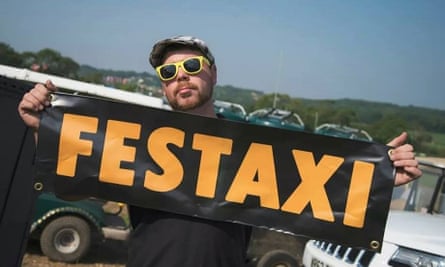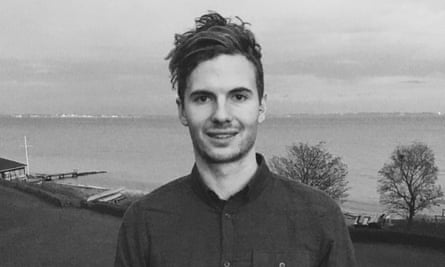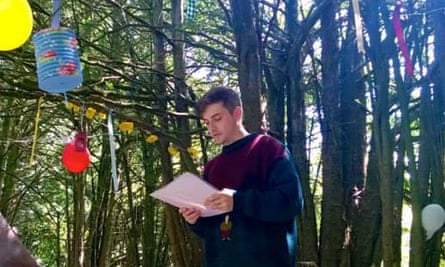‘I may be broke, but I’m so glad I’ve taken this risk’
Amanda Campbell, 24, has built a biodegradeable tent to minimise post-festival dumpage. She founded Comp-A-Tent last year as an architectural studies student at UCL, and is now developing the product for manufacture.
I’ve often volunteered at festivals, and while cleaning up with the recycling crew at Glastonbury I was shocked to see all the tents that were left behind afterwards; the was field littered with thousands of them. I later found out that more than one in five tents are left behind at music festivals, so I designed Comp-A-Tent while at uni to solve this huge environmental problem. It was then I realised the solution could also be a business opportunity.
During my degree course I first tried to make disposable cardboard festival tents; I made them to scale but they were too heavy and there were all kinds of structural problems. So I started looking at bioplastics, trying to make it comfortable inside and lightweight. Eventually I managed to develop a compostable tent.
I then wrote a business plan, and I got a loan that paid for my patent in June 2015. I now have a working prototype that I’m bringing to a few festivals including Glastonbury this summer - I’ve already camped in it, and it worked!
I’m trying to make it as cheap as possible (about £40). I’m only hand-making them at the moment, so the first batch are probably going to be £100 and that’s still actually at a loss.
Money is becoming a big issue now; I quit my job, but I kind of wish I’d stayed part-time. But even though I’m broke and have no time to socialise, I’m so glad I went for it and took a risk. Even if it fails – which I don’t think it will – I won’t feel too bad. After a few months it’s already taken me on the best journey.
‘For five years we didn’t make any money at all’
Daniel Jones, 33, came up with his idea for a festival taxi service in 2010 while studying arts and festivals management at De Montfort University. Festaxi is now in its fifth year and has operated at Bestival among others.

I got the idea for Festaxi while volunteering at Latitude festival. I’d walked several miles over the week, I was tired, and I said to a friend: “I could really do with a taxi”. And then a light bulb switched on.
I was at university at the time, so I approached my lecturer with the idea and they put me in touch with campus enterprise opportunities. They were running a business competition, which I went for and won. I was awarded some time with a lawyer, a business mentor for 30 hours, and £500.
I went to a golf buggy hiring company to rent the vehicles (at this point I’d never even driven a golf buggy). We hired for the first couple of years, and then we sought financial help – from family, personal bank loans, that sort of thing – and purchased a small fleet of five. Later we’d actually go back to renting: it turned out to be easier for us to hire vehicles than to transport and maintain our own.
How much money Festaxi makes is a difficult question, because for the first five years we didn’t make any at all. We’re only now at a point where we’ve made a profit after paying loans and renting vehicles.
To anyone who wishes to set up a business within the festival industry, I’d say do your research: if you’re still at university, make the most of the resources available to you while studying. And make sure you patent original ideas – this is a cut-throat industry.
‘We basically don’t sleep’
Joseph Newton, 25, and Jordan Turnbull, 26, juggle their PhDs in biochemical engineering with festival logistics. Last year they founded Safe & Sound, a service to help festival-goers with their luggage.

Safe & Sound is a luggage transportation service for festival-goers. Customers come to our website, they book a storage crate, and drop their luggage with us in London. We pack their things into the crate, they get their train to the festival hassle free, and collect their luggage at the festival.
Jordan got the idea when he was running the Brighton marathon: there were lockers at the start of the race where you could put your stuff and collect it at the end. It hit home while he was on the train on the way back from Bestival, struggling with his heavy bags.
Last summer we did some market research, developed a business plan and started getting in touch with festivals, various stakeholders and train companies. Festival-goers massively decrease the efficiency of train services from London to Glastonbury each year, so there’s certainly reason for them to be interested.
Right now our money is going towards building a website, marketing and building a brand. There’s not much of an up-front cost, but we need some working capital for the summer when we’re rolling out our service for Latitude and In the Woods. We also need to hire a van or a lorry, some crates, and insurance for our customers’ belongings.
One difficulty is doing a PhD at the same time, which is like a full-time job on its own. We basically don’t sleep. We haven’t really had a weekend in the past year. Running a start-up isn’t a nine-to-five lifestyle, the responsibility is on you to get things done. But we don’t really care – it’s too much fun to feel like work.
The main problem we’ve faced is getting people to take notice of us. Festivals are obviously seasonal, so in the off-season it can be hard to get people to talk or meet with you. Festival organisers tend to have bigger fish to fry, with booking bands and so on. We probably won’t make any money this year, but maybe next year we’ll start to make a profit if all goes well.
‘Mental preparation is key... I meditate a lot, which helps’
Some entrepreneurs take it further and start their own events from scratch. While a student at Exeter University in 2011, Harry Horsfall started a popular club night called Thick as Thieves. By 2014, it had evolved into Hijacked, a one-day festival in Exeter with 5,000 visitors. It’s run annually ever since.

It all started because we ran out of space. Will Millner, Laurence Mulchrone, Freddie Sparrow, Will Wadham and I had started a small club night with 200 friends and every event sold out, again and again. We moved to the biggest venue in town, and carried over the skills we had gained from the first venture.
Running a festival sees massive 20-hour shifts, so mental preparation is key. We were lucky that people believed in us and we managed to raise the cash. We are funding the event ourselves and not paying ourselves salaries. We all have full-time jobs, so this is a real passion project.
Communication has to be clear, so there are a lot of phone calls. We also use Basecamp, Facebook and Whatsapp, which can have its challenges. The most important thing is keeping calm under stress. I meditate a lot, which helps.
Licensing is complicated and there are a lot of risk assessments and event management plans. We work closely with councils and the police to ensure things run smoothly. Health and safety is of utmost importance: this year we really had to consider the risk of legal highs and make sure they weren’t anywhere on site.
The weather is always a major worry. We’ve had rain both years previously but it’s only been fleeting. No amount of planning can prepare us for act-of-God weather. However, we are British. If there is rain, we’ll still dance and enjoy the events. The three-week forecasts are useless, so we’ll just have to trust the gods. Third time lucky this year.
‘My dissertation deadline clashed with booking artists’
Tristan Gatward, 21, is a final-year student at Exeter University who is meanwhile running Poltimore festival in Devon.

The biggest difficulty for me while running the festival has probably been managing the sometimes never-ending administration alongside my degree. My dissertation deadline clashed with the time we needed to book artists and finalise contracts, which was a pretty demanding time.
The technical side of things has been the heftiest expense: stage hire, sound provisions, generators and so on. We’ve been very lucky in that the venue has licensing for alcohol and open air performance, which has saved a lot of time and money.
Last year’s net profit just tapped into four figures, but this year’s gross income has already far superseded that. That being said, our aim at this point isn’t to instantly make a lot of money, but to establish Poltimore festival as a brand that people in the local arts and music scenes can get excited about. It’s important to have a definite reason for setting up a festival, and not to assume that you’ll necessarily make a profit. However, if there’s a location or music scene that you feel is being underrepresented wherever you’re from, that could be your new festival, and it could be really great.
Keep up with the latest on Guardian Students: follow us on Twitter at @GdnStudents – and become a member to receive exclusive benefits and our weekly newsletter.
